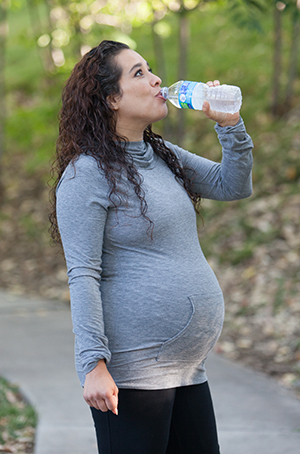Urinary Tract and Kidney Infections
Urinary Tract and Kidney Infections in Pregnancy
A urinary tract infection (UTI) is a very common medical complication of pregnancy. Untreated, a UTI can cause serious problems in pregnancy. Normal urine is sterile. It contains fluids, salts, and waste products. It is free of bacteria, viruses, and fungi. The tissues of the bladder are isolated from urine and toxic substances by a coating that discourages bacteria from attaching and growing on the bladder wall.
The main parts of the urinary tract are:
Two kidneys. A pair of purplish-brown organs located below the ribs toward the middle of the back.
Two ureters. Narrow tubes that carry urine from the kidneys to the bladder.
Bladder. A triangle-shaped, hollow organ located in the lower belly.
Two sphincter muscles. Circular muscles that help keep urine from leaking by closing tightly like a rubber band around the opening of the bladder.
Urethra. The tube that allows urine to pass outside the body.
Types of infections
During pregnancy, there are normal changes in the function and anatomy of the urinary tract. These include kidney enlargement, and compression of the ureters and bladder by the growing uterus. During pregnancy, the bladder does not empty as well. The urine is not as acidic and it contains more sugars, protein, and hormones. All of these factors can increase the risk for a UTI.
Asymptomatic bacteriuria. A silent (without symptoms) infection often caused by bacteria present in the woman's system before pregnancy. This type of infection happens in about 5% to 10% of pregnant women. Asymptomatic bacteriuria may lead to acute bladder infection or kidney infection if left untreated.
Acute urethritis or cystitis. A urethral or bladder infection that causes symptoms including pain or burning with urination, frequent urination, feeling of needing to urinate, and fever.
Pyelonephritis. A kidney infection. Symptoms of pyelonephritis may include those of acute cystitis plus flank (back) pain. Pyelonephritis may lead to preterm labor, severe infection, and adult respiratory distress syndrome.
The most common organism that causes UTI is Escherichia coli (E. coli), a normal organism of the vagina and rectal area. Other organisms may also cause UTI, including group B streptococcus, and sexually transmitted gonorrhea and chlamydia.
In addition to a complete medical history and physical exam, diagnosis of UTI is made by urine testing and culture for bacteria. It is recommended that women be tested at the first prenatal visit and during pregnancy.
Treatment of UTI is important to prevent serious complications. Antibiotics may be given. Women with pyelonephritis in pregnancy often need to be hospitalized to receive intravenous (IV) antibiotics.
Updated:
February 16, 2018
Sources:
Urinary Tract Infections During Pregnancy. Delzell J. Amereican Family Physician. 2000;61(3):713-20., Urinary tract infections in pregnancy: old and new unresolved diagnostic and therapeutic problems. Matuszkiewicz-Rowińska. Archive Medical Science. 2013;11(1):67-77.
Reviewed By:
Greenstein, Marc, DO,Image Reviewed by Staywell medical art team.,Kolbus, Karin, RN, DNP, COHN-S
